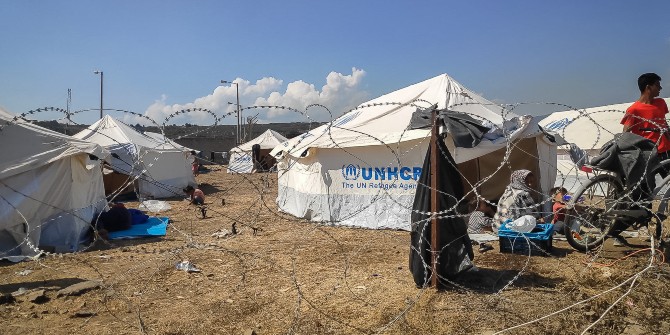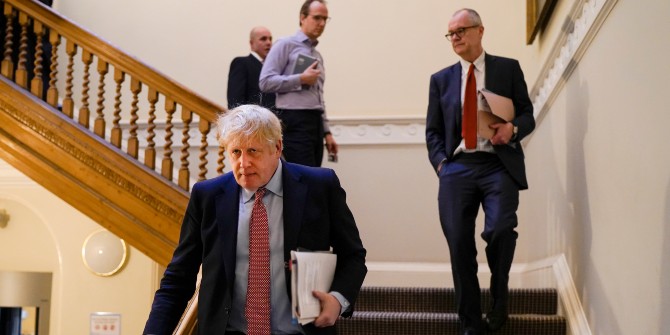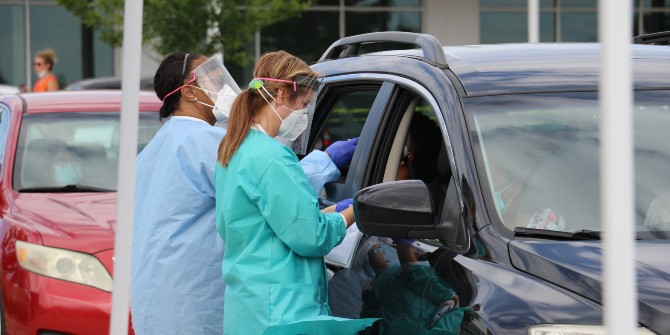The Migration Pact is a first step in tackling the EU’s failures, but it does not go far enough. Marta Foresti (ODI/LSE) says national leaders need to put forward pragmatic proposals to address the reality of human mobility. Recognising and valuing the contribution of migrant workers during the COVID-19 pandemic would be a good start.
Things are bleak on the outskirts of Europe. Even before the fire, the camp at Moria in Lesvos, Greece was unsafe and overcrowded: now its 13,000 people are without shelter, water or adequate supplies. They are victims of EU policy failures and the direct consequence of the reluctance of member states to step up to help manage this human tragedy.

In an effort to address this, the EU published a much-awaited Migration Pact on 23 September – a proposal to help overcome the failure of its migration policies and their deadly consequences, which have been apparent ever since the so-called ‘refugee crisis’ of 2015.
The Pact aims to put in place a system to replace the so called Dublin Regulation, which establishes member states’ responsibility for the examination of asylum applications. As such, the pact is mostly aimed at reforming the asylum system rather than migration at large, and therefore mostly focuses on asylum seekers and refugees.
In seeking a ‘balance between responsibility and solidarity’, the Pact puts pressure on third countries to accelerate returns; it suggests practical ways in which EU member states can act in solidarity (though falling short of agreeing relocation quotas for refugees); it proposes a monitoring mechanism for asylum procedures at European borders; and it provides for 10% of the EU aid budget to be earmarked for migration-related objectives. This includes providing support and resources for third countries hosting refugees and other migrants. In other words, the Migration Pact will focus on keeping people in their countries.
Yet the Pact is likely to disappoint. In the words of Commissioner Ylva Johansson, ‘Nobody will say ‘Hooray’‘. This is because the EU can only do what its 27 member states agree to do. And the reality is that too many of them still have a vested interest in keeping anti-immigration rhetoric going, primarily for domestic short-term political gain.
And sure enough, by Friday three members of the Visegrad Group (Poland, Hungary, Czechia) had indicated their discontent and are unlikely to support the act in its current form, rejecting the concept of compulsory solidarity that underpins it.
In practice, it is highly unlikely that all the EU’s member states will reach consensus on migration policies. However, this does not mean that nothing can be done. Against the political reality of disagreement between member states, what we need is an altogether different approach to migration in Europe: one that recognises the different dimensions of human mobility, the variety of interests and actors involved, and that deploys new tools and ways of working.
First, is there the political space and the will to form a smaller ‘coalition of the willing’ among selected European states and organisations to cooperate on migration in a way that the public can get behind? We know it is possible, as ODI’s recent paper on public attitudes towards immigration and immigrants shows. In practice, what incentives are there for Germany, France, Spain, Portugal, the UK – dare I say it – and others to join forces in pragmatic alliances? Alliances to relocate refugees, to organise search and rescue missing at sea, but also to support a much-needed foreign workforce at the frontline of the COVID-19 response? For example, in France, the citizenship minister Marlène Schiappa has said she wants to recognise the work of foreigners during the lockdown and will be fast-tracking COVID-19 workers for naturalisation. How much more powerful and effective would this be if Germany, France, Spain, Portugal and Italy agree to give foreign workers right to stay and allow them to move freely across borders?
Some may argue that a pragmatic and ad hoc alliance among selected member states would dilute the power of European unity. Yet the Commission’s president Ursula Von Der Leyen is calling for member states to step up to the challenge and consider qualified voting majority in order to speed up reform.
Second, we need to mobilise actors who have an interest in addressing the reality of human mobility, and the opportunities it can bring. Some politicians are stepping up to the challenge: urban mayors from across Africa and Europe are already collaborating on this, launching the mayors’ dialogue on growth and solidarity to be held in Milan in the spring. But businesses and all those who need foreign workers to help deliver services and contribute to the economy also have a vested interest. The contribution of migrants to tackling COVID-19 has been celebrated across the world. In the UK, for example, the vast majority of growth in top incomes and taxes over the past 20 years has come from migrants. Future generations of migrant workers are very likely to be key in achieving the low carbon transition, and to help deliver the Green New Deal that Europe is championing.
Lastly, the public wants to see this sorted, and in a humane, fair and pragmatic way. To make the most of this, we need an altogether different conversation and political approach — not about whether migration is good or bad, or whether borders should be open or closed. This is a conversation about all of us as Europeans, and our collective future, not about ‘them’.
It is time to stop asking the EU to do better: it is national leaders who need to step up to this challenge, making the most of the European institutions and working with mayors, citizens and business leaders to enhance the opportunities and benefits made possible by human mobility.
This post represents the views of the author and not those of the COVID-19 blog, nor LSE.





